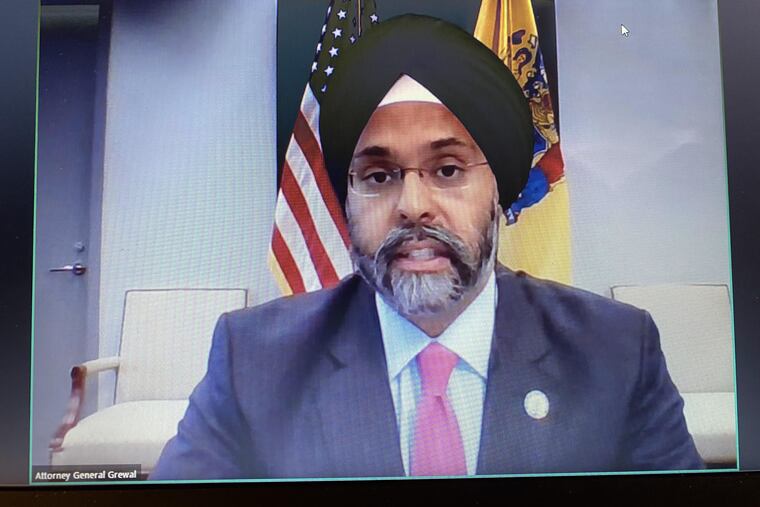N.J. unveils statewide police use-of-force policy that emphasizes de-escalation
The new policy is the first such statewide policy of its kind in the United States and is designed to ensure that officers preserve the rights, liberties, and dignity of residents in all interactions.

New Jersey on Monday announced a new use-of-force policy for law enforcement officers across the state that emphasizes de-escalation and calls for the use of force as a last resort.
The policy is the first measure of its kind in the United States and “demands that every law enforcement officer in our state do all they can to protect the life, liberty, and dignity of every resident in every interaction,” Attorney General Gurbir S. Grewal said in making the announcement.
“The new policy prohibits all forms of physical force against the civilian except as a last resort and only after the officer attempts to de-escalate the situation,” he said during a virtual news conference. It also prohibits all forms of deadly force against a civilian including choke holds and strikes to the head or neck, except as an absolute last resort, he said.
To ensure compliance, Grewal announced what his office called a first-of-its-kind web portal, which officers must use to report within 24 hours details of every instance when force is used. The reporting system will allow the state — and the public — to monitor and analyze use-of-force trends, including racial disparities.
Emphasizing the new web portal and de-escalation techniques, Grewal said: “What we’re undertaking in New Jersey today is unprecedented, and it will not be easy. No state has implemented such sweeping use-of-force policies, training, and monitoring at a statewide level.”
A public version of the portal, which will exclude private details such as medical information, will be available in the first quarter of 2021, the attorney general said.
In a statement, ACLU-NJ executive director Amol Sinha said the new policy “could serve to avoid tragic outcomes and protect fundamental rights, particularly in Black and brown communities which often are the subject of over-policing.”
The updated policy was the result of a yearlong, collaborative effort that included input from law enforcement officials, civil rights and religious organizations, and community members. It marked the first revisions to the state’s policy on the use of force in two decades.
Its unveiling comes amid nationwide calls for police reform and racial justice after the May killing of George Floyd by a Minneapolis police officer and other high-profile killings by police, at times under questionable circumstances.
”We didn’t begin the hard work of transforming policing in New Jersey after George Floyd’s murder,” Grewal said, adding: “But Mr. Floyd’s murder and tragic cases of unjust excessive force added urgency to the public dialogue and the diligent work that all led to today’s far-reaching policies and programs.”
The new policy also establishes several “affirmative duties,” including one that requires all officers to intervene “if they observe another officer engage in illegal or excessive force against a civilian” and another that requires officers to “where appropriate, personally provide medical assistance” or request it after any use of force against a civilian, Grewal said.
Thomas Eicher, director of the Attorney General’s Office of Public Integrity and Accountability, said the new policy, while recognizing the “long, traumatic history of dogs being used to injure and terrorize people of color,” also prohibits the use of police dogs against crowds or protesters as crowd-control measures or against people who resist arrest, but don’t pose a threat. He said his office was tasked with further studying the use of canines.
The new directive also prohibits officers from firing weapons at moving vehicles or engaging in high-speed car chases except under limited circumstances, authorities said.
The New Jersey Attorney General’s Office oversees the county prosecutor offices in the state as well as police departments. The changes will govern all 38,000 state, county, and local law enforcement officers in the state. All officers will undergo an immersive two-day training on the policy next year, and it will take effect Jan. 1, 2022.
Grewal heralded the Camden County Police Department’s use-of-force policy, which included extensive retraining and a system to review all use-of-force instances. “Their use of force has since declined while relationships between cops in the community and public safety have all improved,” he said.
He has emphasized that the vast majority of officers do their jobs properly, but said transparency is key to gaining the public’s trust.
Under the most recent police on use of force, revised in June 2000, law enforcement officers were also directed to exhaust all other reasonable means before resorting to the use of force.
Eicher said what’s different about the new policy is the de-escalation language and that it lays out tactics and strategies that officers can use to resolve situations short of force.
Grewal scheduled a virtual town hall meeting at 6:30 p.m. Monday to review the new policy and related programs. Panelists, including retired Police Chief J. Scott Thomson of Camden County, a lawyer with the American Civil Liberties Union of New Jersey, and an executive with the National Organization of Black Law Enforcement Executives, are slated to discuss the community-informed approach that led to the new policy.